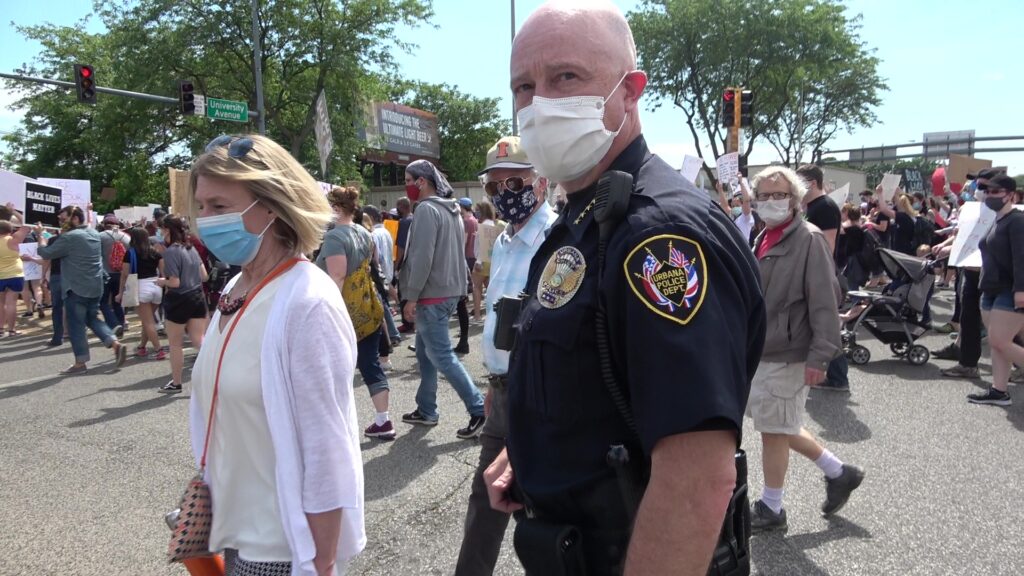
In July of 2020, Urbana, Illinois Mayor Diane Marlin, with much fanfare, announced the creation of an “Advisory Committee on Public Safety and Policing”. The Mayor gave a presentation at a City Council meeting, and she said that the work would be so substantial that the civilian Committee members would need to be provided financial compensation – a proposition virtually unheard of in Urbana.
Over nineteen months have passed, and the civilian Advisory Committee, which has since barely been discussed, appears to have been completely abandoned. To the disappointment of constituents who were inspired by police reform campaign promises, virtually every other police reform opportunity in Urbana has taken a similar path.
Despite it being a focal point for the past several years, the City Council has not attempted to make improvements to the Civilian Police Review Board (CPRB). Aside from voting in favor of discriminatory language which prohibits anyone with a prior felony from serving on the Board, the Council has hardly discussed the CPRB.
The City Council members have seen close to zero compliance with the five sections of their “Resolution Prioritizing Tactical De-escalation in the Use of Force Policy and Police Transparency in Urbana”, which was passed unanimously in February 2021. No civilian has yet been appointed to the Use of Force Review Board, no annual or quarterly Use of Force reports have been provided to the Council or the public, and it seems Chief Seraphin is still refusing to consult the Council on changes to use of force policies.
In September, 2021, the City Council passed a Fraternal Order of Police (FOP) contract which is a near-identical copy of the prior 2017 contract. Contrary to the directives of their previous resolution, use of force and de-escalation do not appear anywhere in the police contract. Despite being advertised by some City Council members as containing several wins for the public, the contract only made the minimum number of changes required to belatedly comply with Illinois State law.
It will be years before the sitting Council has another opportunity to weigh-in on a new FOP contract. Since the Council seems content with the Mayor’s Office being in full control of the negotiation process and schedule, there is a good chance that a new FOP contract will not arise until a new Council is in office.
The Urbana City Council does not appear concerned with the fact that the Urbana Police Use of Force Review Board has been dysfunctional or non-existent for the past several years. Chief Bryant Seraphin has assured the Council that every use of force incident is reviewed by the Board, but the UPD cannot produce any evidence that the Board actually holds meetings or performs incident reviews.
At a recent meeting, Council members sat idle while the Mayor made verifiably false claims in regards to the violent arrest of an Urbana resident in April of 2020.
Two City Officials appointed by the Council, City Administrator Carol Mitten and City Attorney David Wesner, have warned CPRB members that they are not allowed to discuss possible officer misconduct when reviewing TASER incidents.
Before the existing Council took their seats, the City Council used to annually evaluate and vote on appointments to the positions of Police Chief, Deputy Chief, and all Lieutenants. This appointment process was the final means for the Council to exercise some type of police accountability. However, in September of 2021, the City Council voted to remove themselves entirely from overseeing Lieutenant appointments, and they doubled the length of the terms of the Chief and Deputy Chief positions. Every future Urbana City Council member will now have substantially less say over who will reside on the police command staff.
Chief Seraphin has directed his officers to discontinue compliance with TASER review requirement that the Council passed in 2015. The UPD is required to review all TASER displays with the CPRB, but Deputy Chief Richard Surles was opposed to that practice, so he pressured the CPRB members to ignore their directive. Now, only select TASER incidents are shown to the CPRB and even those have often been incomplete and/or delayed for years. Members of the public have warned the Council repeatedly about the Chief’s unilateral changes to the TASER review policy, but the problem has thus far been ignored.
The Urbana Police Department continues to distribute police complaint forms that violate Illinois State law. The complaint forms, along with many complaint requirements listed on various UPD web pages, also explicitly violate the Urbana Fraternal Order of Police contract which started more than twenty months ago.
All things considered, the Urbana City Council has already forfeited many of the opportunities they had to pursue police reform during their terms. In many areas, it seems, Urbana has actually taken several steps backwards.
